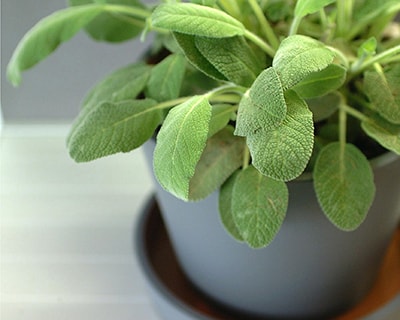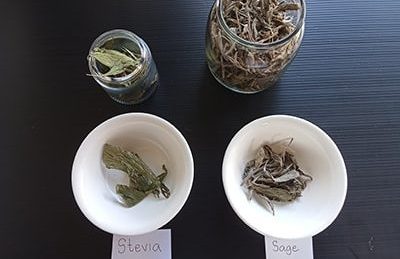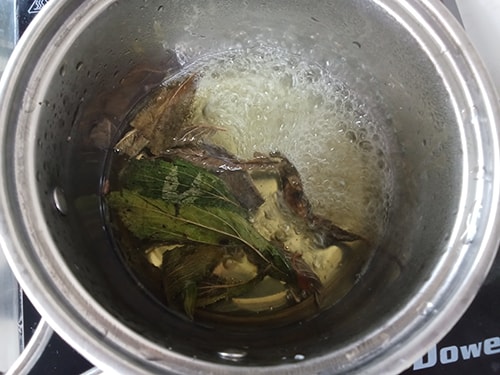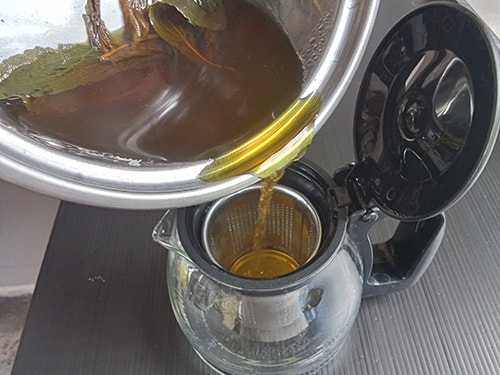
What Sage Does for Your Digestion
This is one of the most effective herbs you can lean on when suffering from digestive upset, if you prepare it the way I’m about to show you in this article.
Sage Benefits for Digestive Health
One of its main uses in herbal medicine is for the treatment and improvement of the digestive system.
The soothing properties of sage are credited to the interaction of flavonoids and digestive enzymes. It helps improve the gut microbiota and protect the digestive system from toxins.
Common sage is sometimes used as a spice to add a peppery taste to food. It is an herb rich in Vitamin K and other minerals like zinc, copper and magnesium.
Occasionally, sage is eaten raw and it’s sometimes used as garnish for salads. Chewing sage leaves may give a slightly bitter taste but it can ease the feeling of nausea and vomiting.
An infusion of dried or fresh sage can relieve the following digestive problems:
Gastritis
Stomach pain due to gas can stem from inflammation of the stomach lining. It can be an effect of taking excess medication, alcohol or a sign of a stomach infection.
The carminative property of sage effectively dispels gas to relieve flatulence and stomach pain. It also has antimicrobial compounds that directly attack the pathogens in the intestine in case of an infection.
Indigestion
Overeating is one of the leading causes of indigestion.
Indigestion goes away on its own but taking sage can cut short the uncomfortable feeling. Sage does not only expel gas but also calms the stomach to relieve the symptoms.
Diarrhea
Sage is antimotility and antispasmodic. When taken fresh, it soothes the digestive system and reduces the frequency of bowel movements. Reducing the transit time also prevents dehydration.
Heartburn
The stomach acid that regurgitates back to the esophagus feels like it is tearing your chest out. We all get heartburn occasionally, especially after eating spicy or acidic food and heavy meals. Greasy food takes too long to digest and when the stomach takes time to empty, it causes heartburn.
Heartburn is also a recurring problem in people with gastroesophageal reflux diseases (GERD) and hiatal hernia. To relieve this temporary but painful condition, take a sip of sage tea to improve the digestive process.
Learn how to make a relieving infusion for digestive problems using only one backyard plant.
Loss of Appetite
Loss of appetite may be caused by physiological or psychological problems. If you are sick, have a tummy infection or experiencing a hormonal imbalance, you will noticeably have a reduced appetite. If you have anxiety, depression and feeling stressed out, it may impact your appetite as well.
For any of these causes, sage is known to provide relief. It promotes the healthy functioning of the gut and speeds up recovery from illnesses.
Other Benefits of Sage
Aside from its excellent contribution to the digestive health, sage is also beneficial for the following health concerns:
Menopausal Symptoms
Sage can be an effective herbal treatment for women’s health, particularly in the menopausal stage. It relieves night sweating and hot flashes which are common symptoms in menopause. Sage contains compounds that regulate the neurotransmitters that are affected by the lowered estrogen production.
Memory Loss
The phenolic compounds and flavonoids found in sage can improve the brain’s cognitive performance. It may reduce or delay the possibility of a degenerative brain disease like Alzheimer’s. Sage is best taken as a tincture for preventing cognitive decline.
Excessive Sweating
Hyperhidrosis, or excessive sweating, is primarily caused by faulty nerve signals. While it is generally not serious, excessive sweating can become socially distressing. Herbal remedies with anxiolytic properties such as sage are considered the best for this condition.
The tannic acid in sage effectively reduces sweating by constricting the sweat glands. It can be managed by taking sage tea or supplements.
Manage High Cholesterol and Blood Sugar Levels
Sage can effectively lower blood pressure as well as the bad cholesterol in the body. It contains antioxidants that reduce the LDL and triglycerides in the blood. Conversely, it increases HDL or good cholesterol and boosts the body’s defenses against free radicals.
Additionally, sage leaves may lower the sugar level and improve insulin sensitivity. It is still under clinical trials but sage holds hope for the treatment of diabetes.
Words of Caution
Sage contains a toxic compound called thujone which can be harmful when taken in high dosages at extended periods. Taken excessively, sage can cause miscarriage. In breastfeeding women, sage taken more than what is normally consumed in food can dry up the milk supply.
Avoid using sage if you exhibit an allergic reaction to it. Do not use sage if you have epilepsy due to its thujone content which can worsen the condition. You should also not consume sage as a food supplement if you are currently taking any medication for blood pressure, cholesterol and blood sugar. The herb is so potent it can interfere with the medicine or double its effect.
If there is any underlying health condition, it is best to consult your healthcare provider beforehand.
Sage Tea Recipe
Preparing sage tea is a simple process. You can use either its fresh form, dried or even the ground ones. If using ground sage for tea, it is best to strain the tea before drinking to avoid its gritty texture.
For this recipe, I am using dried sage leaves. You can buy this easily online or at your local herbal stores. If you want a mellow flavor, you may use fresh sage leaves.
Ingredients:
- 3 to 5 dried sage leaves
- 1 cup water
- 3- 4 stevia leaves (or honey, to sweeten)
Steps:
- Add the sage leaves to the water and boil for 3 to 4 minutes. Add the stevia leaves and steep for one more minute.

- Strain the tea to remove the dried leaves.

- Transfer to a tea cup and enjoy while hot.

Note: Dried herbs are prepared differently from fresh leaves since they are already dehydrated. When using fresh leaves, use about 5 – 6 leaves. Boil a cup of water and pour it over the leaves before adding sweetener.
How To Use
You may also choose to add lemon to your sage tea for some zing It is also great for alleviating nausea but may not be good if your digestive trouble is due to acid reflux. Citrus fruits like lemon can trigger heartburn in some people.
You can drink about three to six cups of sage tea a day. But, do not take it for an extended period. Moderation in herbal teas is still necessary to prevent unwanted side effects.







Could sage be made into a Tincture?
Yes. It says to take as tincture under the memory section. But it also says not to take for extended period of time. Sheesh I’ll forget some part of that. Lol 🤷♀️
Can you use lemon sage?
I love drinking sage tea! I add lemon and ginger to mine and it helps to ease many GI symptoms including nausea, heartburn, diarrhea, constipation and bloating!
I have pineapple sage growing but not sure what to use it for. Would it work the same as normal sage? Thank you.
Does pineapple sage have the same effect on digestion?